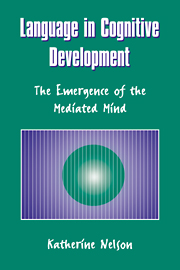Book contents
- Frontmatter
- Contents
- Preface
- I PERSPECTIVES
- II DEVELOPING REPRESENTATIONAL SYSTEMS
- 4 Early Cognition: Episodic to Mimetic Childhood in a Hybrid Culture
- 5 The Emergence of Mediating Language
- 6 Memory in Early Childhood: The Emergence of the Historical Self
- 7 The Emergence of the Storied Mind
- III DEVELOPING CONCEPTUAL SYSTEMS
- IV CONCLUSIONS
- Notes
- References
- Name Index
- Subject Index
5 - The Emergence of Mediating Language
Published online by Cambridge University Press: 05 June 2012
- Frontmatter
- Contents
- Preface
- I PERSPECTIVES
- II DEVELOPING REPRESENTATIONAL SYSTEMS
- 4 Early Cognition: Episodic to Mimetic Childhood in a Hybrid Culture
- 5 The Emergence of Mediating Language
- 6 Memory in Early Childhood: The Emergence of the Historical Self
- 7 The Emergence of the Storied Mind
- III DEVELOPING CONCEPTUAL SYSTEMS
- IV CONCLUSIONS
- Notes
- References
- Name Index
- Subject Index
Summary
The mediating role of language involves its capacity to convey knowledge about the world, about other people, about social and cultural interpretations of situations and events, and about imagined possibilities, plans, mythologies and theories. In this role, language serves a different metafunction than that of regulating interactions between people. Halliday (1975) differentiated between the mathetic and pragmatic functions of language use in the early phases of acquiring conventional linguistic forms, a contrast that captures this distinction as it emerges in development.
A major point to be brought out here is that language must be well developed in order to serve the full range of its mediating functions. The child does not immediately make a leap from prelinguistic to linguistic, or from sensorimotor to representational, or any of the other stage changes that have been proposed as explanations of developments between 1 and 3 years. The transition is long and composed of a complexity of developments in different parts of the social-linguistic-cognitive system. At this point the transitions have been traced most completely in the linguistic system itself, documenting developments in an expanding meaning system, an expanding grammatical system, and an expanding pragmatic system. The connection of these with developments in social and cognitive competencies has been less well worked out. In this chapter some of the major developments that take place to establish language as a mediating system for an individual child are discussed. Succeeding chapters consider how language functions for the preschool child as a mediating system in different representational formats and in different knowledge domains.
- Type
- Chapter
- Information
- Language in Cognitive DevelopmentThe Emergence of the Mediated Mind, pp. 120 - 151Publisher: Cambridge University PressPrint publication year: 1996



